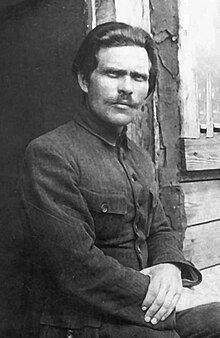Ida Mett
She then went on to participate in the anarcho-syndicalist movements in Belgium, Spain and France, before repression by the fascist Vichy regime forced her to cease her activities.
7 July] 1901,[1] Ida Markovna Gilman was born into a family of cloth merchants,[2] in the predominantly Jewish town of Smarhon, where she was exposed to radical ideas from a young age.
[7] Mett herself defended the provisions in The Platform for the "ideological direction of the masses", arguing it to be necessary for anarchists to make their ideas predominate within the workers' movement and distinguishing the tactic from party political aspirations to take state power.
She also worked as a correspondent for the International Institute of Social History and returned to writing for the syndicalist newspaper La Revolutión Proletarianne, although she eventually broke with the latter after it published an antisemitic article.
[2] Mett also served as a key primary source for biographies on Nestor Makhno by Michael Malet,[15] Victor Peters,[16] and Alexandre Skirda.
[17] In her own memoirs about Nestor Makhno, Mett described the exiled Ukrainian anarchist as incredulous and diffident towards many of his own friends, depicting within him an anti-intellectual streak and jealous temperament.
[28] When pressed on these allegations by Makhno's biographer Alexandre Skirda, Mett failed to provide further details, leading him to dismiss them as hearsay.
[29] Skirda was fiercely critical of Mett's memoirs on Makhno, which he described as amounting to slander, concluding that she "deserves to be assessed on other, more pertinent of her writings.

